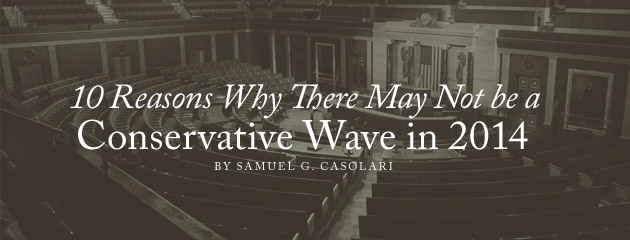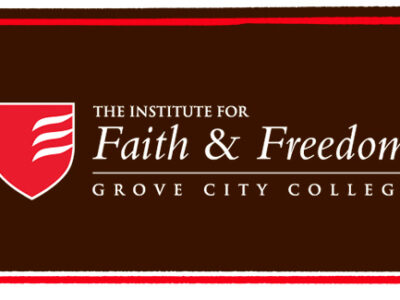
On Tuesday, Americans will head to the polls to vote in several highly contested midterm races across the country. Many in the conservative media have high hopes for numerous Republican victories. I’m not so sure.
Though Republicans will likely retain control of the House of Representatives and have a good chance of taking majority control of the Senate, it will not be as a result of a conservative wave like the country witnessed in 1994 and 2010. The motivation to vote just doesn’t seem to be present in the conservative base. From lack of clear leadership to large divides on key issues, here are 10 reasons why I foresee a minor swell for Republicans but not a wave.
1. Leadership drift. The Congressional Republican leadership lacks a coherent, credible, and competent conservative agenda. So far, I have not heard any leader express concrete ideas with clear cut messages to appeal to and motivate voters.
2. Immigration. Here is an important issue that Republicans and Democrats disagree on. Unfortunately, no other issue separates Republican elites from the conservative base more than immigration. All throughout 2013 and some of 2014, establishment Republicans were suggesting an immigration deal—a grand compromise so-to-speak—along with the need to embrace comprehensive reform. So what’s causing the divide? The semantics. Elite Republican opinion has, at times, characterized immigration-reform proponents as backward, exclusive, and even nativist. This is hardly a formula to get conservative voters to the polls.
3. The Mississippi Run-off. Another way to get conservatives not to vote came soon after Chris McDaniel defeated Senator Thad Cochran in the Mississippi primary. The elite went all-out to savage McDaniel and protect Cochran. It was a direct message to the conservative base not to fool with the elite. It is difficult to motivate the conservative base when perceptions suggest that the elite used political tricks to help push a long time senator over the finish line—barely.
4. The 2010/2012 Blame Game. Again, it is hard to inspire the conservative base when the base is blamed for poor candidates in the 2010 and 2012 elections. Elite Republican opinion is of the mindset that if the party had not nominated candidates such as Christine O’Donnell, Sharron Angle, or Todd Akin the Republicans would have been in the majority since 2012. Of course this thinking does not take into account the failure of the candidacies of Tommy Thompson, Heather Wilson, Rick Berg, or Denny Rehberg.
5. Establishment Republicans are struggling. The candidates that were supposed to be the safe and electable candidates have been struggling in the polls. Pat Roberts in Kansas and Thom Tillis in North Carolina are in tight races. Though they may win, they will struggle to do so without an enthusiastic and dedicated conservative base going to the polls.
6. The lawsuit. The congressional leadership is touting a lawsuit to challenge executive overreach. A lawsuit, however meritorious, will not influence voters to head to the polls. For conservatives—who are not always enthused by lawsuits to begin with—the lawsuit will be viewed as a stunt that lacks substance and merely underscores legislative inaction.
7. Third parties and independent campaigns. Libertarian and independent campaigns are filling the void in some races. This is preventing the wave from building. Libertarian campaigns may blunt Republican efforts in Kansas, North Carolina, and Georgia. This can certainly be read as a symptom of conservative disaffection with establishment campaigns that repeatedly have little or no credible conservative vision.
8. Conservative fatigue. Conservatives are tired. After big wins in 1994 and 2010, conservatives continued to watch as the GOP drifted away from the core principles that fueled those two wave elections. Indeed, they perceive—right or wrong—that elite Republican leaders consider them to be backward, ill-informed, and not savvy enough to “win” elections. Conservative core voters sense a “need not apply” sign when it comes to the Republican Party.
9. Medicaid expansion. No issue demonstrates the hypocrisy of some Republican leaders more than Medicaid expansion. Though many Republicans opposed President Obama’s Affordable Care Act, some eagerly held their hands out for the expanded federal dollars for states and their Medicaid programs. For rank-and-file conservative voters this is very apparent and dispiriting.
10. Good campaigns and candidates matter. We may very well be in a cycle of mediocre candidates both from the establishment and the conservative movement. A wave can, in part, build from good candidates; conversely, a wave does not guarantee a bad candidate will win. This cycle, with so many deadlocked races, demonstrates the lack of strong viable candidates or (as Joe Scarborough says) good political athletes from both sides of the aisle.
When America wakes up on Wednesday the Republicans may very well be holding a majority in both the House and Senate. But it could have been a lot better. There are many reasons why 2014 is unlikely to be a conservative wave election. Republicans and conservatives should take note and learn some lessons.




